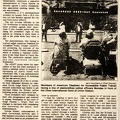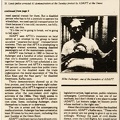[This artlice continues in ADAPT 412, but the entire text is included here for easier reading.]
PHOTO 1: A group of protesters in wheelchairs, in a rough line, head down the street toward the camera. In front and to one side a policeman on a motorcycle/trike.
Caption: ADAPT demonstrators, with police escort, on their way from the Arch to Union Station, via Market Street
PHOTO 2: Four protesters in wheelchairs block a flight of stairs in a lobby type area as people walk by. From left to right they are Ryan Duncan, Heather Blank, unknown protester, and Wayne Spahn. Caption: Demonstrators blocked access to stairways in Union Station, trying to force a confrontation with APTA officials.
[No Title or author or publication given for this article on the clipping. It does not appear be the start of the article.]
"They bill it as door to door service, but it does crazy things like, if you want to go from west county to the city, it will pick you up but leave you at the city-county line."
Bi-State plans to expand the service in December by adding 11 lift-equipped vans and extending the service into the city. The system will also extend its hours of operation, to 6 a.m. to 7 p m. Its use in the city limits will be limited to disabled passengers, Plesko says, and, with the extended hours, disabled workers will be able to use the service to get to their jobs.
While some other cities are making similar (or greater) progress — San Francisco, for one, has lifts on every one of its buses — things are still moving too slowly for the members of ADAPT. And they blame the slow pace on APTA. (ADAPT members who came to St. Louis this week stressed that they were here because of their quarrel with APTA and were not here to demonstrate against Bi-State. They said they approved of the plans Bi-State had made for the achievement of 100 percent accessibility, but nonetheless questioned the slow pace at which that was occurring.)
The fight between ADAPT and APTA has its roots in the 1970s. During the Carter administration, the Department of Transportation (DOT) issued rules requiring transit systems to have at least half of their buses equipped with wheelchair lifts. Those regulatioms came out of the Rehabilitation Act of 1973, a landmark federal law that many in the disabled community point to as being equivalent to the Civil Rights Act of 1964.
But APTA filed suit against DOT for its regulations and a federal court upheld APTA's argument for "local option," that is, allowing individual transit authorities to decide how they would comply with the spirit of the regulation requiring adequate accessible transportation for the disabled.
Says APTA's Engelken, "These decisions are best made locally, because the local transit systems understand the needs of their passengers. For example, it would not be feasible to have a transit system for the disabled based on 100 percent lift-equipped buses in Fargo, North Dakota, because in the winter it would be almost impossible for someone in a wheel chair to get to a bus stop and wait for a bus. Able-bodied people have enough trouble (there)."
Says Bob Kafka, another ADAPT leader, "(That) is one of the arguments people use for not providing transportation. They say, 'People in a motorized wheelchair can't get there, so why provide (accessible buses)?' But do you know what a person in a motorized wheelchair has to do to get to the bus stop? He has to hit a joystick. Little old ladies cleaning people's homes for years, with fallen arches, and having to carry shopping bags, no one has ever said we need special transit for them. But a disabled person who has to hit a joystick to operate his wheelchair, we need special transportation for them because it’s too cold, too snowy, too hilly, too wet, too this.
"It's like were going to break, were going to fall apart."
ADAPT sees APTA's insistence on local option as an attempt by the group to foster so-called "separate-but-equal” transportation systems. They say that APTA is attempting to segregate transit systems; keeping disabled passengers out of the mainstream system.
ADAPT was formed in 1982 in Denver by Auberger and a handful of other members of that city's disabled community. It was put together because APTA had scheduled a convention for Denver and APTA's resistance to 100 percent accessible main-line public transportation for the disabled made the trade organization the moral equivalent of "the Ku Klux Klan and the Nazi party" for disabled Americans, Kafka says.
Thirty demonstrators showed up at the first protest, and there have been eight subsequent protests, all at APTA regional or national conferences. The demonstrators model their actions after the non-violent civil rights activists of the 1960s. They block access to buses: they block access to the APTA convention sites. Some, including Auberger, chain themselves to buses or to doorways.
The aim is arrest and the accompanying media attention. Auberger has been arrested at least 30 times by his own count, including this past Sunday at the Omni Hotel.
ADAPT's militant tactics have drawn criticism from several corners, including others who work in the disabled community.
"While we agree with the goals and-objectives of accessibility for disabled persons, we don't agree with the tactics of civil disobedience or confrontation as a means to achieve those objectives," says Ginny Weber, assistant to Deborah Phillips, the commissioner of the city's Office on the Disabled.
"There are other ways to get things done," she says. "You can go through the legislative process. You can conduct public awareness campaigns. Over the last 10 years, some progress has been made. To change conditions that have been in existence for a long time takes a while. You have to just stay in there' and keep working towards it."
Sheldon Caldwell, executive director of the St. Louis Society for Crippled Children, agrees. "I don't think it pleads our case well to have a group with a disruptive militant attitude. This is my personal opinion: I haven't polled my staff on this, but I don't think disruption is ever the way to go about it.
But others are not as harsh in their judgment.
"I take a different position (from those who criticize ADAPT)," says Paraquad's Tuscher. "I have the point of view that there are many ways to get from where we are to where we want to go. We're more likely to use negotiation, legislative action, legal action, public relations campaigns. Confrontation is not one of our methods, but I don't think it's my place to judge (ADAPT). Let history judge: let history prove whose method is the right one."
About the criticism from within the disabled community, ADAPT's Kafka says, "Those who are in power are not going to give it up to you willingly. Without the push of civil disobedience, even the Civil Rights Act would never have come about."
Says Auberger, "(Negotiation and public relations campaigns) delay the justice. It's not perceived as delaying justice, but it is. They are doing harm to their disabled brothers and sisters by saying, 'I don't support their tactics, but I do agree with their position.— Because other groups for the disabled receive so much financial support from corporations, they are less willing to be as direct in their demands as is ADAPT, he says. "They will eat a lot of garbage just to get half the loaf.
"If you're going to change things, you have to get rid of the notion right away that you are going to be someone's friend," he says. "Be-cause someone is going to want something different than you do. The city of St. Louis and I will never be friends. The police and I will never be friends, but I won't lose any sleep over it. I know when I leave here, people will be talking about this issue in a way it hasn't been talked about before and something might change.
"You look at demonstrators in history. Go back to the civil rights movement. The blacks who demonstrated weren't seen as 'nice.' If you go back further, to the women's suffrage movement, those women who wanted the right to vote weren't seen as mom and apple pie. But typically people who have been vocal about their rights are never perceived as being nice."
PHOTO 1: Two men, one a plain clothes policeman and the other the bus driver, load a man in a scooter onto an accessible bus as several other people in suits and uniforms look on.
Caption: St. Louts police arrested 41 demonstrators at the Sunday protest by ADAPT at the Omni.
PHOTO 2: A man (Mike Auberger) with his hair pulled back tightly, wearing glasses, a beard and an ADAPT no steps T-shirt, sits in a long hall with bars of light on the walls and ceiling. He holds up his hands, fingers permanently folded at the first joint, guesturing as he speaks. He has a chest strap to hold him in his motorized wheelchair.
Caption: Mike Auberger, one of the founders of ADAPT
- Created on
- Thursday 11 July 2013
- Posted on
- Wednesday 20 December 2017
- Tags
- ADAPT, Albert Engelken, APTA, APTA conference, arrest, be nice syndrome, Bi-State Development Agency, blocking, blocking buses, blocking stairs, Bob Kafka, chains, civil disobedience, Civil Rights Act of 1964, civil rights movement, Denver, door to door, DOT - Dept of Transportation, Fargo, fragile, Heather Blank, hours of operation, Jim Tuscher, Ku Klux Klan, lift equipped buses, local option, local people with disabilities, march, media, militant, Nazi Party, Office on the Disabled, Paraquad CIL, police escort, power analysis, President Jimmy Carter, Rehabilitation Act of 1973 - section 504, rules, Ryan Duncan, San Francisco, separate but equal, St Louis Society for Crippled Children, The Arch, Union Station, Wayne Spahn
- Albums
- Visits
- 22032
- Rating score
- no rate
- Rate this photo


0 comments